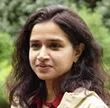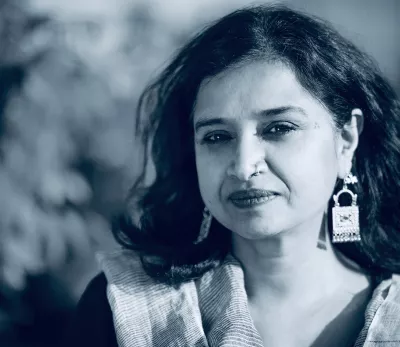Listen: Dance Professor Pallabi Chakravorty on Indian Reality Show and Bollywood Dancers

Stephen Lang Professor of Performing Arts
Dance
Affiliations: Asian Studies, Sociology & Anthropology, Lang Center, Dance , English Literature
Areas of interest: Kathak dance, Visual Anthropology, South Asia

Research
Pallabi Chakravorty’s research and artistic works bring disparate bodies of material into dialogue with each other. Her research and writing on the transformation of the Indian performing arts have forged an original and critical approach to contemporary dance anthropology and dance studies that challenge a western epistemological gaze and taken-for-granted categories for investigation. Her academic research is located at the intersections of visual and performing arts, history and anthropology, film and media studies, gender and postcolonial studies, religion, and bodies. Her first book Bells of Change (2008) is the first critical study of India’s Kathak dance within the discourses of the “modern” and the “classical” and traces the arc of two centuries of Kathak from colonial nautch (of the tawaif and the baiji) to the global stage. The overarching focus in the book is on gender, power, and identity. Her second book (This is How We Dance Now, 2017) is on dance reality shows, consumerist aesthetics, and the explosion of Bollywood and celebrity culture. This narrative thread is braided with the emergence of a new aspirational class of dancers in India who disrupt the status quo of elite upper-caste dance identities. The book combines long-term ethnographic fieldwork in the cities of Mumbai, Kolkata, and Pune with media and film theory. Pallabi has also co-edited three books: Performing Ecstasy in 2009, Dance Matters, also in 2009, Dance Matters Too in 2018. She has published dozens of journal papers and book chapters, edited proceedings (Dance in South Asia, 2002), and an ethnographic film (Kathak in the City). Her new project on yoga, performance, and healing combines medical anthropology and physical practices with ethnography to analyze bodies, identities, nationalism, dance, and health. She hopes to break new ground with this work.
Performance and Dance Making
Pallabi is an active dance maker and cultural worker and a lifelong student of classical Indian dance. The sources for her creative inspirations range from the romantic poets of England (whom she studied as an undergraduate in Jadavpur University, Calcutta), the Bhakti poets of medieval India, the courtesan poets of colonial India, and her dance teacher, Bandana Sen. Her choreographies combine her training in anthropology and Kathak dance to express a postcolonial modernist voice that is deeply personal, but embraces the collective. Her choreographies are based on historical and contemporary events in India, such as partition, the anti-nautch movement, globalization, migration, and violence.
Pallabi founded Courtyard Dancers, a South Asian organization in Philadelphia, in 2000. Courtyard Dancers is a nonprofit community-centered arts organization (with branches in Pittsburg and Kolkata) interested in developing a community of dancers and audiences who can engage with dance/movement for empathy, empowerment, and cultural literacy. It hosts the first and only dance and music festival devoted to the South Asian diaspora in Philadelphia (Facing East, presented in 2015, 2017, and 2019). Several videos of her choreographies are on the company website (courtyarddancers.org).
Teaching
Pallabi’s courses at Swarthmore cover theory, history, and practice. They aim to help students understand the vitality of the performing arts in all societies and their connections to the humanities and social sciences. They are regularly cross-listed with Sociology and Anthropology, Gender and Sexuality Studies, Asian Studies, Film and Media Studies. Her classes also help to ground students in cross-cultural fieldwork and the cultivation of community-oriented leadership. She has been active in decolonizing and internationalizing the Dance curriculum to incorporate multiple ways of knowing and dancing. In addition to academic courses, Pallabi teaches Kathak dance technique and repertory classes in which she works with students to showcase Kathak-based choreographies in student concerts.
